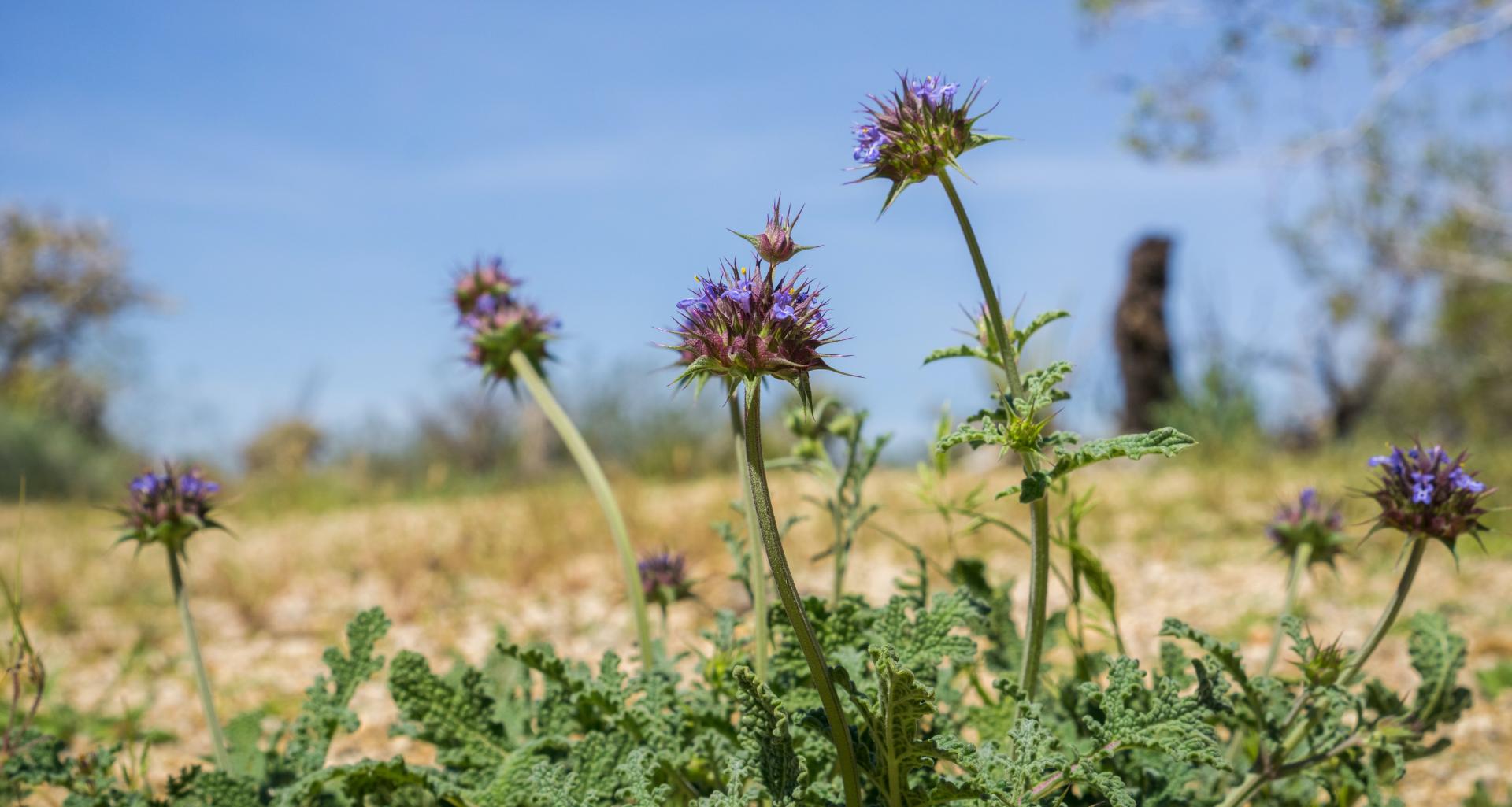Ecosystems
Drought can alter the ecological balance of natural systems and harm fish, wildlife, and plant species, as well as the services that these ecosystems provide to human communities.
Ecological regions (ecoregions) are areas of general similarity in ecosystems and in environmental resources. They serve as a spatial framework for the research, assessment, management, and monitoring of ecosystems and ecosystem components.
This map shows forest ecoregions from EPA's Level 1 Ecoregions of North America, alongside weekly drought conditions from the U.S. Drought Monitor (USDM).
This map shows prairie ecoregions from EPA's Level 1 Ecoregions of North America, alongside weekly drought conditions from the U.S. Drought Monitor (USDM).
This map shows desert ecoregions from EPA's Level 1 Ecoregions of North America, alongside weekly drought conditions from the U.S. Drought Monitor (USDM).
This map shows Mediterranean ecoregions from EPA's Level 1 Ecoregions of North America, alongside weekly drought conditions from the U.S. Drought Monitor (USDM).
Drought can alter the ecological balance of natural systems and harm fish, wildlife, and plant species, as well as the benefits that these ecosystems provide to human communities. The environmental consequences of drought include losses in plant growth; increases in fire and insect outbreaks; altered rates of carbon, nutrient, and water cycling; and local species extinctions.
Learn MoreDrought can alter the ecological balance of natural systems and harm fish, wildlife, and plant species, as well as the benefits that these ecosystems provide to human communities. The environmental consequences of drought include losses in plant growth; increases in fire and insect outbreaks; altered rates of carbon, nutrient, and water cycling; and local species extinctions.
Learn MoreDrought can alter the ecological balance of natural systems and harm fish, wildlife, and plant species, as well as the benefits that these ecosystems provide to human communities. The environmental consequences of drought include losses in plant growth; increases in fire and insect outbreaks; altered rates of carbon, nutrient, and water cycling; and local species extinctions.
Learn MoreDrought can alter the ecological balance of natural systems and harm fish, wildlife, and plant species, as well as the benefits that these ecosystems provide to human communities. The environmental consequences of drought include losses in plant growth; increases in fire and insect outbreaks; altered rates of carbon, nutrient, and water cycling; and local species extinctions.
Learn MoreU.S. Forests in Drought
U.S. Prairies in Drought
U.S. Deserts in Drought
U.S. Mediterranean Regions in Drought
U.S. Drought Monitor Categories
Ecological regions (ecoregions) are areas of general similarity in ecosystems and in environmental resources. They serve as a spatial framework for the research, assessment, management, and monitoring of ecosystems and ecosystem components.
This map shows forest ecoregions from EPA's Level 1 Ecoregions of North America, alongside weekly drought conditions from the U.S. Drought Monitor (USDM).
This map shows prairie ecoregions from EPA's Level 1 Ecoregions of North America, alongside weekly drought conditions from the U.S. Drought Monitor (USDM).
This map shows desert ecoregions from EPA's Level 1 Ecoregions of North America, alongside weekly drought conditions from the U.S. Drought Monitor (USDM).
This map shows Mediterranean ecoregions from EPA's Level 1 Ecoregions of North America, alongside weekly drought conditions from the U.S. Drought Monitor (USDM).
The U.S. Drought Monitor map is updated weekly on Thursday mornings, with data valid through that Tuesday at 7 am Eastern.
The U.S. Drought Monitor map is updated weekly on Thursday mornings, with data valid through that Tuesday at 7 am Eastern.
The U.S. Drought Monitor map is updated weekly on Thursday mornings, with data valid through that Tuesday at 7 am Eastern.
The U.S. Drought Monitor map is updated weekly on Thursday mornings, with data valid through that Tuesday at 7 am Eastern.
Drought can alter the ecological balance of natural systems and harm fish, wildlife, and plant species, as well as the benefits that these ecosystems provide to human communities. The environmental consequences of drought include losses in plant growth; increases in fire and insect outbreaks; altered rates of carbon, nutrient, and water cycling; and local species extinctions.
Learn MoreDrought can alter the ecological balance of natural systems and harm fish, wildlife, and plant species, as well as the benefits that these ecosystems provide to human communities. The environmental consequences of drought include losses in plant growth; increases in fire and insect outbreaks; altered rates of carbon, nutrient, and water cycling; and local species extinctions.
Learn MoreDrought can alter the ecological balance of natural systems and harm fish, wildlife, and plant species, as well as the benefits that these ecosystems provide to human communities. The environmental consequences of drought include losses in plant growth; increases in fire and insect outbreaks; altered rates of carbon, nutrient, and water cycling; and local species extinctions.
Learn MoreDrought can alter the ecological balance of natural systems and harm fish, wildlife, and plant species, as well as the benefits that these ecosystems provide to human communities. The environmental consequences of drought include losses in plant growth; increases in fire and insect outbreaks; altered rates of carbon, nutrient, and water cycling; and local species extinctions.
Learn MoreEcological Drought
Drought can impact natural ecosystems and the services they provide to human communities.
Integrated Planning
Natural ecosystems and their benefits should be incorporated into future planning for drought impacts.
Drought Impacts on Ecosystems
Historically, drought has been viewed in terms of its agricultural, hydrological, and socioeconomic impacts—how drought affects ecosystems and the services they provide to human communities was often not discussed. The term ecological drought has been employed relatively recently to capture this emphasis on how drought impacts ecosystems. It encompasses and emphasizes the environmental consequences of drought, which include losses in plant growth; increases in fire and insect outbreaks; altered rates of carbon, nutrient, and water cycling; and local species extinctions.
It’s important to note that the concept of ecological drought does not exclude humans from the equation. Rather, it recognizes that the relationship between humans and ecosystems in the context of drought is closely linked. For example, an ecosystem that has been significantly altered by human development is now more vulnerable to drought than it once was for a variety of reasons, including increased competition for water resources.
When a drought occurs, the existing pressures on the ecosystem’s natural water supplies are amplified. If the ecosystem’s water needs aren’t considered in water allocation decisions, then this already vulnerable ecosystem may be pushed beyond the threshold at which it can recover. The ecosystem will begin to function differently, leading to a loss in the critical services it once provided humans—such as purifying water and air, preventing erosion, and providing recreation opportunities. This shows how human and natural systems influence each other in the context of drought and demonstrates the real value of considering the water needs of ecosystems and the effects of human water and land use on ecological water supplies.
The U.S. Geological Survey (USGS), through its regional Climate Adaptation Science Centers, has led early efforts to examine ecological drought across the country. Its Ecological Drought initiative supports the management of ecosystems and human communities in the context of drought. To help meet this aim, the SNAPP Ecological Drought Working Group, which NIDIS was a part of, focused on understanding the natural and human dimensions of ecological drought impacts, and promoting the application of solutions that provide mutual benefits to people and nature. NIDIS is funding a project that seeks to better understand ecological impacts of droughts by strengthening our understanding of ecological drought vulnerability and translating and delivering that information for drought planning processes.
Drought Early Warning for the Ecosystems Sector
Drought early warning is essential to prepare for and mitigate the ecological impacts of drought. The resources below are organized by the key components of a drought early warning system: (1) drought observation and monitoring; (2) drought planning and preparedness; (3) prediction and forecasting of drought; (4) communication and outreach to the public and affected sectors; and (5) interdisciplinary and applied research on topics of concern to drought-affected sectors.
Planning & Preparedness

Prediction & Forecasting

Communication & Outreach

Interdisciplinary Research & Applications


Related Content
Data & Maps | Vegetation
Drought can result in reduced growth rates, leaf loss, and increased stress on vegetation. Visit this page to view data, maps, and tools that monitor and forecast drought's effects on vegetation.
Research & Learn | Ecological Drought
Healthy ecological systems support every form of life, and drought can alter or degrade critical ecosystem functions and services. Learn more about ecological drought here.
Research & Learn | Flash Drought
Flash drought can quickly deplete soil moisture and dramatically increase evaporative stress on the environment. Learn more about flash drought here.


